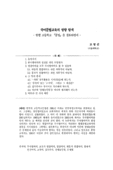

-
 * 본 문서는 배포용으로 복사 및 편집이 불가합니다.
* 본 문서는 배포용으로 복사 및 편집이 불가합니다.
미리보기
서지정보
· 발행기관 : 우리말학회
· 수록지 정보 : 우리말연구 / 15권
· 저자명 : 고영근
목차
1. 들어가기
2. 부사형어미의 설정은 과연 타당한가
3. 연결어미를 모두 부사형어미로 볼 수 있을까
3.1. 대등적 연결어미는 과연 자족적이 아닐까
3.2. 종속적 연결어미는 과연 자족적이 아닐까.
4 그 밖의 문제
4.1. ‘ 거라’ 규칙활용은 시의(時意)에 맞는가.
4.2 ‘첨가어’ 또는 ‘교착어’, 그리고 그 개념은?
4.3 접속부사는 부사어로 처리해야 하는가.
4.4 이른바 ‘상대높임법’은 어디에 배치해야 하는가
5. 마무리-몇 가지 제안초록
한국의 고등학교문법은 1985년 이래로 단일국정교과서로 편찬되고 있
다. 그전에는 검인정이었으나 교과서마다 체계가 달라 가르치기에 어려움이
많아 국정으로 전환하였다 그 사이 네 차례에 걸쳐 교과서가 편찬되었는데
2001년까지는 1985년의 체계가 유지되었으나 2002년에 와서는 부사형어미를
다시 세우는 등 체계를 달리한 것이 많다. 이 논문에서는 부사형어미가 설정
되어서는 안되며 모든 연결어미를 부사형어미로 처리하는 현행문법교과서의
잘못을 지적하였다. 그밖에도 접속부사는 부사어가 아니며 이른바 상대높임법
은 문체법과 같이 서숨되어야 한다는 점을 강조하였다 그리고 앞으로는 문볍
교과서도 1985년 이전과 같이 검인정으로 환원되어야 한다는 사실을 제안하
였다.영어초록
The high school grammar of Korean has been published as the single-unified book
since 1985. Before that time it was the authorized textbook. But the textbook had
been compiled by the government since 1985. because it was difficult to teach
owing to different grammatical systems of the textbook. During the past 15 years
the school grammar of Korean had been compiled 4 times, but the 1985' s system
had been preserved until 2001. In the 2002's textbook there are many changes of
grammatical systems including the establishment of adverbial endings. In this
paper I assert that adverbial endings should not be set up in the system of
conclusive endings and it is not tenable to treat all the connective endings as
adverbial endings. Besides, I emphasize that connective adverbs could not be
treated as adverbials and that speech level endings should be described in the
same place as sentence-conclusive endings. In the near future, I will propose that
the school grammar textbook should restore the past authorized text book system.참고자료
· 없음태그
-
자료후기
-
자주묻는질문의 답변을 확인해 주세요

꼭 알아주세요
-
본 학술논문은 (주)학지사와 각 학회간에 저작권계약이 체결된 것으로 AgentSoft가 제공 하고 있습니다.
본 저작물을 불법적으로 이용시는 법적인 제재가 가해질 수 있습니다. -
해피캠퍼스는 구매자와 판매자 모두가 만족하는 서비스가 되도록 노력하고 있으며, 아래의 4가지 자료환불 조건을 꼭 확인해주시기 바랍니다.
파일오류 중복자료 저작권 없음 설명과 실제 내용 불일치 파일의 다운로드가 제대로 되지 않거나 파일형식에 맞는 프로그램으로 정상 작동하지 않는 경우 다른 자료와 70% 이상 내용이 일치하는 경우 (중복임을 확인할 수 있는 근거 필요함) 인터넷의 다른 사이트, 연구기관, 학교, 서적 등의 자료를 도용한 경우 자료의 설명과 실제 자료의 내용이 일치하지 않는 경우
“우리말연구”의 다른 논문도 확인해 보세요!
-
주제어와 대조초점 - 어순 및 강세와 관련하여 - 24 페이지
우리말에서 도움토씨 ‘-는’은 주제어와 대조의 두 기능을 가지는 것으 로 기술되어 왔는데, 이륜 간추리면 다음과 같다. 보동 ‘ 는’ 생분이 월머리에 놓이면 주제어로 해석되는데 월머리에 놓인 ‘一는’ 성분일지라도 강세가 부여 되면 대조초점으로 해석된다 그런데 이러한 논의가 재대로 검증되가 위해서는, 어순이나 강세가 한국어 에서 차지하는 역할에 대하여 염멸하.. -
"됐어"의 화용적 기능 18 페이지
이 논문은 대화에서의 ‘됐어’의 화용적 기능을 밝히는 데 목적이 있다 대화에서의 ‘됐어’는 ‘-이 이루어지다’라는 기본의미에서 멸어졌으며, 모자란 월이면서도 다양한 기능을 가지고 있다 ‘됐어’의 화용적 기능은 선행발화에 따라 수락 표시의 기능, 발화 중지 요청의 기능, 거절 표시의 기능으로 분류 된다. 이상의 수락, 중지, 거절의 기능을 가진 ‘됐어’는 활.. -
소유풀이씨 "가지다"의 원형과 확장 구조 22 페이지
소유풀이씨 ‘가지다’는 으뜸풀이씨에서, 도움풀이씨, 토씨, 담화표지로 문법화하는 것으로 나타난다 으뜸풀이씨로서 소유물이 구체적인 것에서 추상 적인 것으로 확대되는 것은 ‘은유’에 의해서 설명이 가능하다. 또 까지다’가 [소유 획득]과 [소유 지속]이 시간적 인접성에 의한 환유에 의해서 두 가지로 해석되므로 [A'B]로 요약할 수 있다. 다응 ‘가지다’의 소.. -
동사의 어휘규칙과 동사토 {-더-} 20 페이지
이 논문에서는 우리말 봉사토 {-더-}를 형태론적 단위로 분석하면서도 그것의 문법적 기능이 ‘구’에 반영될 수 있음을 보일 것이다. 그러한 논의를 위해 먼저, 우리말 동사토의 형태·통어적 특성을 반영할 수 있는 동사의 어휘 규칙에 대해 설명한다 이 동사의 어휘규칙은 HPSG의 원리에 바탕을 두되, - 특히 토와 같은 - 우리말의 특성에 맞도록 서민정(200.. -
종결어미 "-니"의 기능과 의미 26 페이지
우리말은 세계에서 유래를 찾기 어려울 정도로 종결어미가 발달된 언 어이다. 이렇게 종결어미가 발달된 것은 우리말을 사용하는 언어대중의 의식 속에 종결어미에 대한 구분의 필요성을 강하게 느끼기 때문이다. 이러함에도 서구 언어이론의 틀 속에서 우리말의 체계화를 논의하고 있기 때문에 종결어 미에 대한 체계화는 아직 만족할 만한 단계에 이르지 못하고 있다. 특히 ..
문서 초안을 생성해주는 EasyAI


